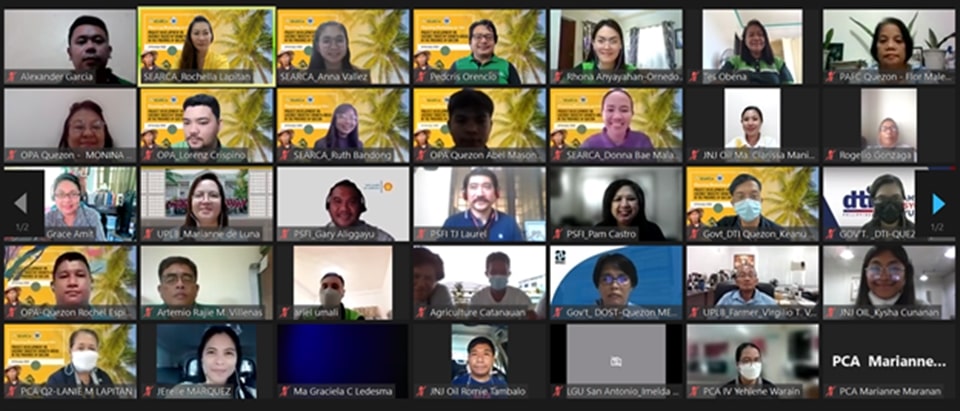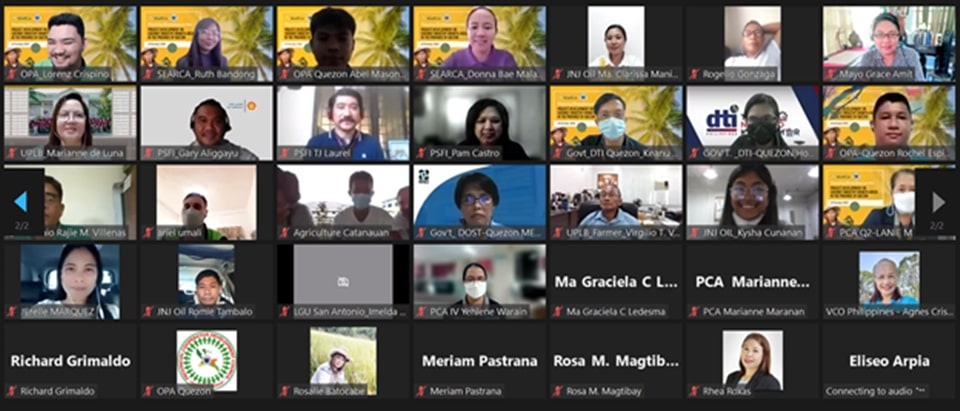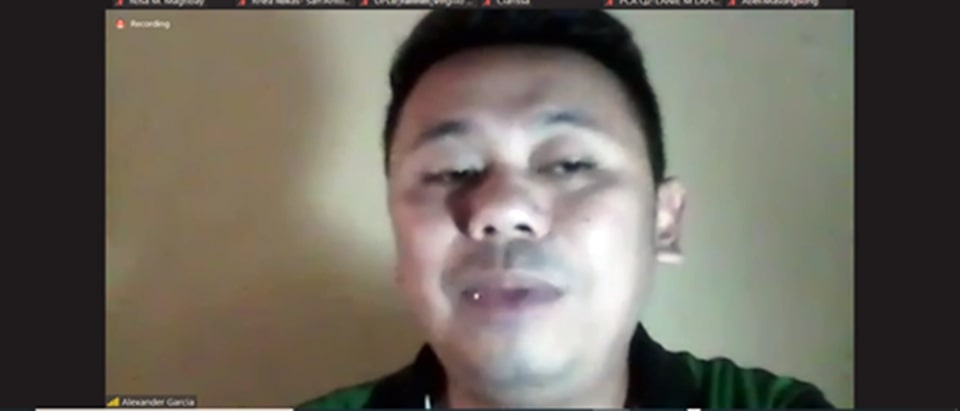
 Participants of the planning workshop.
Participants of the planning workshop.
Conveying together the partners and stakeholders for the collaborative project titled, The Project Development on Coconut Industry Growth Areas in the Province of Quezon, the project team from the Southeast Asian Regional Center for Graduate Study and Research in Agriculture (SEARCA) and the Provincial Government of Quezon (PG Quezon) conducted a planning workshop on 19 October 2021via the Zoom platform. In line with SEARCA’s initiative of scaling up successful agricultural and rural development (ARD) research models to other crops and locations within and outside the country, the planning workshop served as a venue in finalizing the project proposal by validating the baseline information; sharing and harvesting feedback from stakeholders on the draft project rationale, strategic framework, and logical framework; and summarizing stakeholder comments, commitments, and way forward for the project. The workshop has also confirmed key project design, elements, and activities and determined the scope and level of engagement of the participants.
Mr. Alexander G.Garcia, OIC-Assistant Provincial Agriculturist, Office of the Provincial Agriculturist welcomed the participants of the planning workshop. He expressed their gratitude to SEARCA and the stakeholders who attended the workshop and said that on behalf of the PG Quezon, they expected to have a fruitful collaboration with the partners.
 Mr. Garcia welcomed the participants of the planning workshop.
Mr. Garcia welcomed the participants of the planning workshop.
Dr. Pedcris M. Orencio, SEARCA’s Program Head of the Research and Thought Leadership Department (RTLD) started off the program by answering the question “Why do we scale out ISARD?” through sharing the experiences from Piloting Inclusive and Sustainable Agricultural and Rural Development (ISARD) Models in Oriental Mindoro and Leyte. He illustrated the transition of pathways from ISARD to implementing Accelerating Transformation Through Agricultural Innovation (ATTAIN) in the Southeast Asian Region, introduced the ISARD Model, discussed the Sustainable Food Systems (adopting FAO’s Sustainable Food and Agriculture Principles), and presented way forward considerations for scaling ISARD towards achieving ATTAIN (using the Triple Bottomline Approach for Sustainability) for Quezon’s consideration. Shortly after, Prof. Mayo Grace C. Amit, Technical Coordinator, presented the coconut industry situation of Catanauan, Quezon and the logical framework of the project.
 Dr. Orencio discussed the transition pathway from ISARD to ATTAIN.
Dr. Orencio discussed the transition pathway from ISARD to ATTAIN.
 Prof. Amit discussed the Catanauan industry situation and the project logical framework.
Prof. Amit discussed the Catanauan industry situation and the project logical framework.
The breakout sessions took off from the plenary session where the participants had an opportunity to shoot questions and give suggestions. The participants were grouped into sectoral categories: Government/Academe, Private Sectors, and Farmer Groups. The sessions allowed the participants to identify regular activities, ongoing and pipeline projects of organizations and programs, and project and activities of agencies or private sector where farmers are involved in; solicit suggestions for potential complementation and collaborative undertakings; and gather other suggestions. The groups presented their respective outputs at the end of the program.
Principally, the partnership achieved its complementary objectives and the mutual desire to pursue further collaboration in areas of common interest such as enterprise development, capacity development, and participatory research activities. It also successfully linked and networked with various agencies, institutions, and organizations to generate support for activities in this project development phase. Consequently, the planning workshop summed up the component and activities of the project through a project proposal. The workshop outputs were synthesized, integrated, and turned into development strategies that will further help the coconut growth industry areas of Quezon and ATTAIN the twin goals of food security and poverty reduction.
The planning workshop was participated in by the Local Government Unit of Catanauan, national and regional government agencies (i.e., Philippine Coconut Authority, PCA; Department of Science and Technology through the Philippine Council for Agriculture, Aquatic, and Natural Resources Research and Development DOST-PCAARRD; Department of Trade and Industry, DTI: Technical Education and Skills Development Authority, TESDA; and the Provincial Agricultural and Fishery Council, PAFC), the academe (i.e., Southern Luzon State University (SLSU); Polytechnic University of the Philippines (PUP) Mulanay; Quezon National Agricultural School; Agricultural Systems Institute UPLB), private sectors (i.e., Pilipinas Shell Foundation, Inc.; Quezon’s Best; GreenLife Coconut Products Philippines Inc; Coco Deli Coconut Products; JNJ Oil Industries, Inc.; ProSource Coconut; CocoPallet International; YAKAP AT HALIK Multi-Purpose Cooperative), farmers and farmer-organizations (i.e., San Antonio Pala VCO Producers Association; Pederasyon ng Samahan ng Magniniyog sa Quezon (PSMQ); San Antonio Pala Lambanog Producers Association), and other key coconut industry players in the province.
The workshop was led by Dr. Orencio, Program Head; Ms. Anna Gale C. Vallez, Program Specialist; Ms. Rochella B. Lapitan, Senior Program Associate; and Ms. Ruth Jazrel M. Bandong, Project Associate, all of RTLD of SEARCA. On the other hand, Ms. Ma. Leonellie G. Dimalaluan, Acting Provincial Agriculturist; Ms. Monina Jacobo, Division Head of the Coconut Development Division (CDD); Mr. Alexander C. Garcia, Supervising Agriculturist; Mr. John Arrish S. Ocampo, Planning Officer II; all of the Provincial Agriculture Office (PAgO) Quezon, also led the workshop on behalf of PG Quezon. Professor Mayo Grace C. Amit, the project’s Technical Coordinator, acted as the facilitator and moderator of the planning workshop.